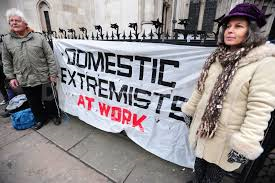
If you’re reading this then the chances are you could be a “domestic extremist”? Do you even know what that means? Don’t worry since not many of us do. It’s a word that’s crept into the lexicon over the last 10-15 years since the establishment of New Labour’s remodelled version of the secret state – institutions such as the National Public Order Investigation Unit, the National Extremism Tactical Coordination Unit and the National Domestic Extremism team.
These units were set up in response to the success of anti-capitalist, animal rights and environmental movements of the late nineties. In 2006 all three were merged under the Association of Chief Police Officers and a national database of domestic extremists was built up which now numbers several thousand.
By then the term had broadened to include – in the police’s own words -groups or individuals who “commit or plan serious criminal activity motivated by a political or ideological viewpoint”. Something can be a “serious crime” when it is carried out by “a large number of persons in pursuit of a common purpose”. So that could include the groups who sabotaged the badger cull or anti-fracking protests for example.
In truth anyone who wants to radically change society and build a more just, equal or sane world is likely to be viewed as a “domestic extremist” and get on the database. In fact journalists and photographers who have made complaints against the police and even politicians such as London Assembly Member Jenny Jones have had the label applied to them.
It is in the nature of the state to always be fearful and suspicious of the people it rules over. Those who rise to the top – the rich and powerful – deeply distrust the rest of us and with good reason: they know exactly how iniquitous and venal the system is they help to perpetuate. Accordingly the rest of us – the working class – are viewed as dangerous and unpredictable. The 2011 riots proved that beneath the apparently stable order of society there are tumultuous forces to be contained.
It is easy to let this make you paranoid and suspicious and that would be playing into the hands of the oppressors. The so-called “secret police” went overground during the last decade. Whereas before spying and surveillance were done covertly by groups like Special Branch, in the New Labour era, they also become a tool of intimidation through employing “in yer face” tactics of filming by Forward Intelligence Teams (FIT).
For several years it appeared that on every demo there would be a group of cops with cameras and sometimes they’d also have sheets of paper with mug shots of activists to watch out for. The situation became so ridiculous that I was even followed on one occasion when I wasn’t doing anything political at all. I simply went into a building where a meeting I was unaware of was taking place and on leaving I noticed a FIT team behind me!
The effect of all this has understandably been to deter some from being politically active. The reasons why the numbers of people on demos or involved in grassroots campaigns has declined in the past decade is complex and can’t be whittled down to one cause, but there is little doubt that covert surveillance and with it feelings of intimidation and criminalisation has been a factor.
But in the last two or there years the mood has shifted. Thanks in part to revelations about undercover cops in protest groups and the Edward Snowden leaks, the secret state has had the glare of publicity shone on it. Importantly it has moved beyond mere activist circles to the point where even ordinary people – to use that term – have felt their privacy and integrity is being threatened and violated.
New struggles have come along which have attracted a fresh influx of activists who are untainted by the past. The anti-fracking and badger cull campaigns spring to mind. Other activists, meanwhile, have been fighting back in the form of groups such FIT Watch, who have themselves filmed the surveillance teams, and NETPOL – the Network for Police Monitoring.
Last year on 5 February NETPOL launched the first “Domestic Extremist Awareness Day” by asking for campaigners to find out if secret records are held about them by making subject access requests to the Metropolitan Police’s National Domestic Extremism and Disorder Intelligence Unit.
This year they are following that up by asking you to tell them on Facebook – or on Twitter using #domesticextremist – “what might make you a so-called domestic extremist”. Er, how many days have you got…?
To find out more about Domestic Awareness Day 2015 see: https://netpol.org/2015/01/28/domestic-extremist-awareness-day-2015/
To find out if the police hold data on you see: https://netpol.org/campaigns/dont-be-on-a-database/subject-access-requests-an-introduction/
Leave a Reply